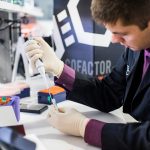Cofactor Genomics Opens Early Access to New T Cell Exhaustion Models through Predictive Immune Modeling Platform
— Announces “Functional to FFPE” Early-Access Grant Program —
San Francisco — November 6, 2019 (REPORTABLE) — Cofactor Genomics, leaders in RNA-based technologies and diagnostics, announced today they will provide early access to a new feature in their Predictive Immune Modeling platform which enables cell-state characterization within FFPE tissue samples. Measuring cell-states, such as T cell exhaustion, has been cited as integral to improving the accuracy of patient selection for immune checkpoint inhibitors. The field has previously failed to reach consensus on a short list of individual analytes that effectively characterize exhaustion using incumbent technologies, leading Cofactor to address this challenge using multidimensional biomarker models.
Cofactor is offering access to the technology through the “Functional to FFPE” Early Access Grant Program, which will support solid tumor or engineered cell therapy exploratory studies, with up to $100,000 in reagents, sequencing, and analysis support covered by the company.
Cofactor’s platform is underpinned by the industry’s first database of Health Expression Models, built using machine learning to identify multidimensional gene expression patterns that enable highly-sensitive characterization of cell types in heterogenous tissue or cell samples. With this new feature, the database has been expanded to include validated models for unstimulated T cells, activated T cells, and exhausted T cells.
The presence of terminally exhausted T cells has been shown to negatively predict success with anti-PD-1 checkpoint inhibitor therapies. As a result, the ability to detect cell state – such as exhaustion – has garnered significant interest, but has proved difficult with clinical archives. Previously, only viable tissue and laborious functional assays were able to generate difficult-to-interpret rough approximations of cell state.
“The ability of RNA-based models to accurately characterize these important cell states in FFPE tissue samples is exactly the reason why Cofactor has invested in Predictive Immune Modeling. No other technology – genomic or proteomic – has been able to accomplish this in FFPE,” stated Cofactor’s Chief Scientific Officer Jon Armstrong. “We have to move beyond just detecting cells, and better characterize how those cells are influenced by their microenvironment.”
In addition to today’s announcement, Cofactor will be presenting early results using these new cell state models, sharing data from collaborative studies via poster presentations, and releasing other product updates this month at the Annual Meetings for the Association for Molecular Pathology (Booth #2319) and Society for Immunotherapy of Cancer (Booth #535).
About Cofactor Genomics
Cofactor Genomics is on a mission to enable true precision medicine through Predictive Immune Modeling. Cofactor has leveraged its experience as one of the first CAP-certified, clinical RNA sequencing laboratories to develop new methods that accurately characterize disease. Instead of searching for isolated, single-analyte biomarkers, Cofactor’s products create multidimensional biomarkers that better capture the complex immune response. Cofactor has spent years pioneering the molecular and machine learning tools to build a database of Health Expression Models, enabling advancements in Predictive Immune Modeling. With their molecular, informatic, and database tools, Cofactor Genomics enables their partners to deliver more expedient, cost effective, and successful clinical trials by building better biomarkers. Find out more about how Cofactor Genomics is revolutionizing biomarker discovery and immuno-oncology at cofactorgenomics.com.




